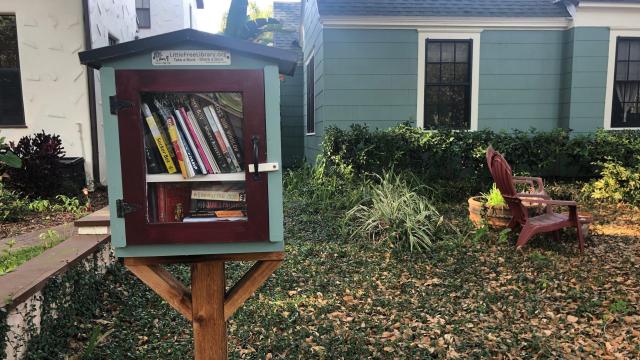If your personal library has long since outgrown the bookshelves in your house, it’s probably time to pare things down. Donating old books to your local library, secondhand store, or Little Free Library is a great way to pass them on to a new home, but some books just aren’t appropriate to give away. As a donor, it’s on you to know the difference.
The whole point of donating books is for someone else to read them. And like clothes, food, toys, and other donated goods, the used book you donate should actually be desirable — not a pile of your trash for someone else to deal with. Before you donate a book, ask yourself two questions: Is it still physically possible for someone to read this? If so, would anyone even want to?
Don’t donate books that are in really rough shape
Donated books don’t go straight from your tote bag to the shelf — someone has to sort through them first. All the books that are too damaged to read get thrown out, recycled, or sent out for repairs, so there’s no point in even donating them. If a book is dirty, moldy, stained, torn, sun-bleached, water damaged, missing pages, covered with margin notes, busting apart at the spine, or otherwise damaged to the point of being unreadable, do everyone a favour and dispose of it yourself. You’ll save library workers, volunteers, and your fellow readers a lot of trouble.
Don’t donate books that are wildly out of date
Some books age better than others — and often, physical condition has nothing to do with it. Old information is useless at best and dangerous at worst, so think twice before offloading any outdated books. Here are the two main categories to watch out for.
Books with out-of-date information
Old reference materials are among the least valuable books you can donate; textbooks, technical manuals, how-to guides, and travel guides from years past just aren’t going to be very helpful to anyone who picks them up. Enthusiasts or collectors might be interested, but they have to find the book first — which they can’t do if the donations manager at the library or Goodwill (correctly) declines to put your Y2K survival guides or chemistry textbook from 2004 on the shelf.
A slightly more niche example of outdated books is an ARC, or advanced reader copy. These are basically early, unofficial book drafts publishers send out before publication day for reviewing purposes. Because ARCs are not the final version of a book, they may have typos, grammatical errors, and other small issues that the writer and editor will change before sending the manuscript to print. For this reason, libraries don’t accept ARC donations, so if you’re sitting on a pile of them, don’t box them up and send them to your local library.
Bigoted or otherwise harmful content
Maybe this goes without saying, but if you want to offload a book specifically because it’s racist, homophobic, transphobic, misogynist, fatphobic, or just plain nasty, maybe don’t put it back out into the word. This is especially important if you’re planning on donating to your neighbourhood Little Free Library; LFLs are often geared towards kids and families, and the less bigotry kids absorb, the better.
What to do with books you can’t donate
So you’ve edited your donate pile down to the most valuable, desirable titles, and now you have a second pile of books with nowhere to go. What to do? You still have a few options:
- Sell them: Listing super-niche and/or outdated books on a resale site like eBay or Craigslist is probably your best shot at finding them a home. Just make sure they’re in decent, readable condition.
- Swap them: ARCs are particularly hard to donate, even in perfect condition — but your friends and family might be interested. If you have ARCs of popular titles, ask around to see if anyone wants them. A few typos are better than waiting three months for a library copy.
- Recycle or trash them: Sometimes a book is destined for the big recycling facility in the sky, and that’s OK. Look up your local recycling guidelines to make sure they accept books, and if they don’t, contact your library for help.
Ultimately, whenever you’re donating books, it’s your responsibility to think about who would actually want to read them. It’s the best strategy for making sure your books end up where they belong, whether that’s a Little Free Library or the recycling bin.

Leave a Reply
You must be logged in to post a comment.